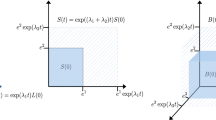Abstract
In this paper we explore equivalence conditions and invariants for behaviors given in kernel representations. In case the kernel representation is given in terms of a linear matrix pencil, the invariants for strict equivalence are given by the Kronecker canonical form which, in turn, we interpret in geometric control terms. If the behavior is given in a kernel representation by a higher order rectangular polynomial matrix, the natural equivalence concept is behavior equivalence. These notions are closely related to the Morse group that incorporates state space similarity transformations, state feedback, and output injection. A simple canonical form for behavioral equivalence is given that clearly exhibits the reachable and autonomous parts of the behavior. Using polynomial models we also present a unified approach to pencil equivalence that elucidates the close connections between classification problems from linear algebra, geometric control theory, and behavior theory. We also indicate how to derive the invariants under behavior equivalence from the Kronecker invariants.
Similar content being viewed by others
References
Aling H, Schumacher JM (1984) A nine-fold decomposition for linear systems. Int J Control 39: 779–805
Bisiacco M, Valcher M-E (2001) Behavior decompositions and two-sided diophantine equations. Automatica 37: 1387–1395
Brunovsky P (1970) A classification of linear controllale systems. Kybernetika 6: 173–187
Fagnani F, Zampieri S (1997) Classification problems for shifts on modules over a principal ideal domain. Trans Am Math Soc 349: 1993–2006
Fuhrmann PA (1976) Algebraic system theory: an analyst’s point of view. J Franklin Inst 301: 521–540
Fuhrmann PA (1979) Linear feedback via polynomial models. Int J Control 30: 363–377
Fuhrmann PA (1981) Duality in polynomial models with some applications to geometric control theory. IEEE Trans Autom Control AC-26: 284–295
Fuhrmann PA (1996) A polynomial approach to linear algebra. Springer, New York
Fuhrmann PA (2002) A study of behaviors. Linear Algebra Appl 351–352: 303–380
Fuhrmann PA (2003) A note on continuous behavior homomorphisms. Syst Control Lett 49: 359–363
Fuhrmann PA (2005) Autonomous subbehaviors and output nulling subspaces. Int J Control 78: 1378–1411
Fuhrmann PA, Helmke U (2010) Unimodular equivalence of polynomial matrices. In: Hu X, Jonsson U, Wahlberg B, Ghosh B (eds) Three decades of progress in control sciences: dedicated to Chris Byrnes and Anders Lindquist. Springer, Berlin
Fuhrmann PA, Rapisarda P, Yamamoto Y (2007) On the state of behaviors. Linear Algebra Appl 424: 570–614
Fuhrmann PA, Willems JC (1979) Factorization indices at infinity for rational matrix functions. Integr Equ Oper Theory 2: 287–301
Gantmacher FR (1959) The theory of matrices, vol. I/II. Chelsea Publishing Company, New York
Kailath T (1980) Linear systems. Prentice Hall, Englewood Cliffs
Kalman RE (1971) Kronecker invariants and feedback. In: Proc Conf on ODEs Math Research Center, Naval Research Laboratory, Washington, DC
Kronecker L (1980) Algebraische Reduktion der Scharen bilinearer Formen. S.-B. Akad, Berlin, pp 763–776
Morse AS (1973) Structural invariants of linear multivariable systems. SIAM J Control 11: 446–465
Polderman JW, Willems JC (1997) Introduction to mathematical system theory. Springer, New York
Pugh AC, Karampetakis NP, Vardulakis AIG, Hayton GE (1994) A fundamental notion of equivalkence for linear multivariable systems. IEEE Trans Autom Control 39(5): 1141–1145
Pugh AC, Antoniou EN, Karampetakis NP (2007) Equivalence of AR-representations in the light of implusive-smooth behaviour. Int J Robust Nonlinear Control 17(8): 769–785
Rapisarda P, Willems JC (1991) State maps for linear systems. SIAM J Contr Optim 35: 1053–1091
Rosenbrock HH (1970) State-space and multivariable theory. Wiley, New York
Vardulakis AIG (1991) Linear multivariable control. Wiley, Chichester
Weierstrass K (1867) Zur Theorie der bilinearen und quadratischen Formen. Monatsh Akad Wiss, Berlin pp 310–338
Willems JC (1986) From time series to linear systems. Part I: finite-dimensional linear time invariant systems. Automatica 22: 561–580
Willems JC (1989) Models for dynamics. In: Kirchgraber U, Walther HO (eds) Dynamics reported, vol. 2. Wiley, New York, pp 171–269
Willems JC (1991) Paradigms and puzzles in the theory of dynamical systems. IEEE Trans Autom Control AC-36: 259–294
Author information
Authors and Affiliations
Corresponding author
Additional information
P.A. Fuhrmann was partially supported by the ISF under Grant No. 1282/05. U. Helmke was partially supported by the DFG under Grant HE 1858/12-1.
Rights and permissions
About this article
Cite this article
Fuhrmann, P.A., Helmke, U. Equivalence conditions for behaviors and the Kronecker canonical form. Math. Control Signals Syst. 22, 267–293 (2011). https://doi.org/10.1007/s00498-011-0061-z
Received:
Accepted:
Published:
Issue Date:
DOI: https://doi.org/10.1007/s00498-011-0061-z




